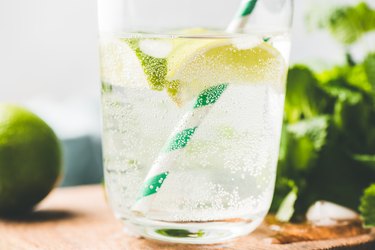
There's a reason nutritionists recommend drinking at least 8 glasses of water per day while limiting soda — or better yet, avoiding it altogether. Water is calorie-free, hydrating and the benefits are many. Soda is loaded with sugar and calories but does nothing for your health.
While the sweetness of the carbonated beverage may be enticing, ditch the soda pop and reach for water instead.
Video of the Day
Video of the Day
1. Water Helps You Stay Hydrated
Throughout the day, you lose about 8 cups of water from your body. If you don't replace this lost water, it can lead to dehydration, which presents as thirst, headaches, dizziness, drowsiness, nausea, vomiting, muscle cramps and dry mouth.
Soda doesn't replace the water you lose, and caffeinated sodas can actually make dehydration worse by increasing urine production. A 12-ounce can of caffeinated soda contains 45 milligrams of caffeine — about half that found in an 8-ounce cup of coffee.
Tip
If you do drink soda, drink an extra glass of water for every can of soda.
2. Soda Isn't Doing Your Waistline Any Favors
A 12-ounce soda contains about 150 calories, almost all of which come from sugar. Drink two sodas a day for 30 days and you'll have taken in about 5 pounds of sugar and a whopping 9,000 calories just from the beverage alone.
Over time, this regular soda consumption can lead to weight gain and the health problems that come with it, such as fatty liver disease and metabolic syndrome. The Harvard School of Public Health notes that diet sodas aren't much better. The artificial sweeteners in diet soda may cause cravings for sweet foods and drinks, which can lead to an increase in calorie intake and weight gain.
On the other hand, water can help you control your weight. According to the Academy of Nutrition and Dietetics, adults who drink a large glass of water before a meal eat about 75 fewer calories at that meal. Water is also devoid of calories and sugar.
3. Soda Isn't Great for Your Teeth
The sugar and acid in soda don't just wreak havoc on your waistline, they also do a number on your teeth. The acids present in soda can break down the enamel on your teeth, increasing your risk of cavities and tooth decay.
The sugar in soda also serves as a feeding ground for the bacteria present in your mouth. As the bacteria feed on the sugar, they create enamel-damaging acids in the process.
Water that contains fluoride — like tap water or fluoridated bottled water — promotes dental health. The fluoride strengthens the teeth, making them less susceptible to damage from plaque and sugars.
Make the Switch from Soda to Water
If you're a regular soda drinker, making the switch from soda to water cold turkey can be difficult. Start by upping your water intake by one or two cups per day without making any other changes.
As you get used to drinking more water, start cutting back on soda. If you normally drink two 12-ounce cans of soda per day, cut it down to one. If you drink one can, cut your intake down to 6 ounces.
Make the transition easier by jazzing up your water. Pour yourself a glass of sparkling water and flavor it with a squeeze of fresh lemon, lime or orange.
- Harvard School of Public Health: 'Sugary Drinks'
- International Journal of Obesity: 'Changes in Water and Beverage Intake and Long-Term Weight Changes: Results from Three Prospective Cohort Studies'
- Delta Dental: 'Food Friends and Foes for Your Teeth'
- Wisconsin Dental Association: 'Sip All Day, Get Decay'
- CNN Health: Dehydration: 'Not Just a Summer Thing'
- Academy of Nutrition and Dietetics: 'How Much Water Do You Need'
- Harvard School of Public Health: 'Artificial Sweeteners'